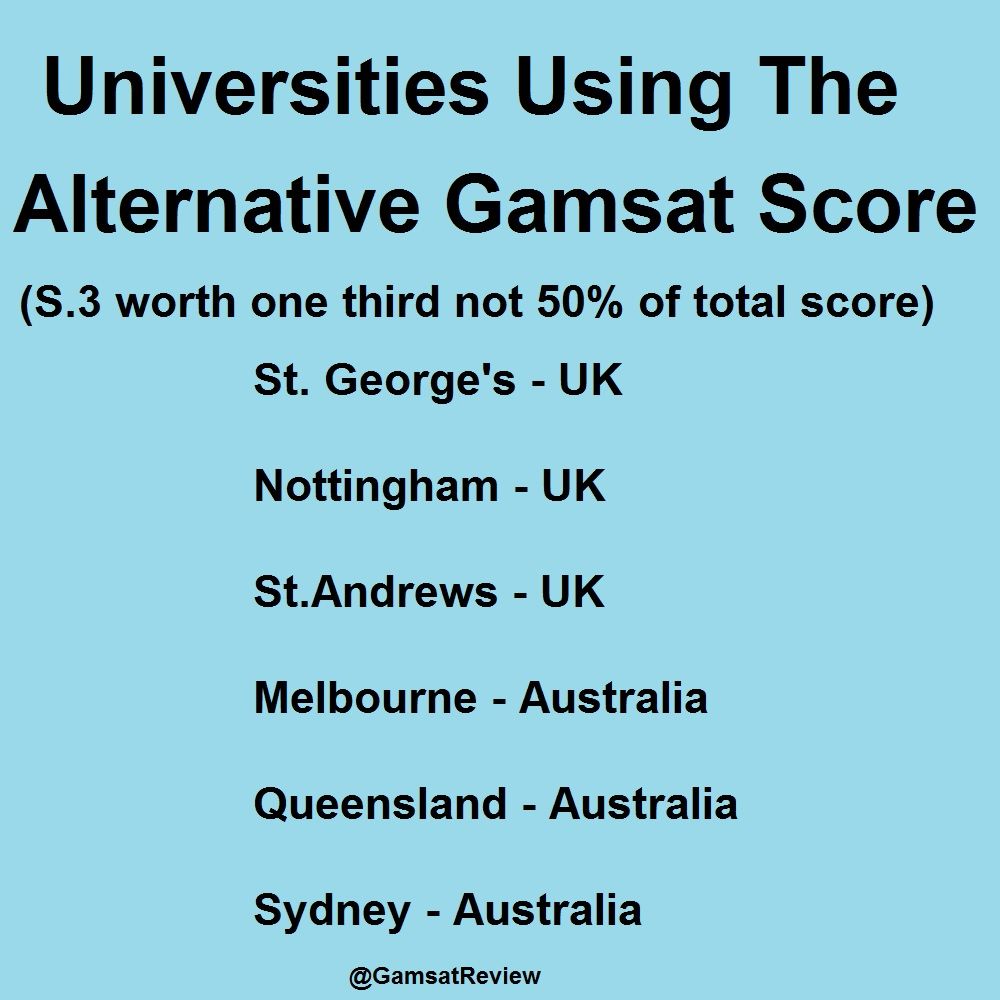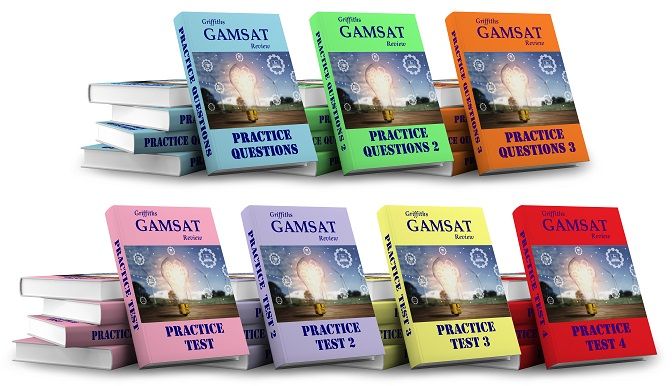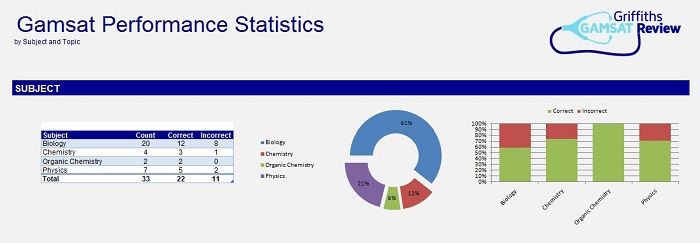GAMSAT Section 3 - How To Prepare For 2023
Worried about how to prepare for Gamsat section 3?
Let me try and help you out with this post.
Section 3 Strategies
Resources For Section 3 Science
Syllabus For Gamsat Section 3
How To Prepare For Gamsat Section 3 With A Non Science Background
Practice Tests For Gamsat Section 3
Section 3 Tips From Real Students
Biology For Section 3
Chemistry For Section 3
Physics For Section 3
Maths For Section 3
The Day Of The Test
First off I'm not going to just reproduce the stuff you can easily find on the ACER Gamsat website like a lot of articles on this subject do.
Let's just assume you already know the number of questions and the proportions of biology, chemistry and physics etc etc. and if you don't then head on over to the ACER website and download the free guide to the test which they give you there.
It covers all the basic information and is updated every year.
What I'm going to cover in this post is the following:
1. Some section 3 specific strategies to help you start your preparation.
2. Tell you the best resources to use to study the science.
3. Give you a suggested syllabus so you know what to study.
Before we get into that however let me just say one thing, if you're stressing about section 3, then don't.

It is possible to do well in Gamsat even though you know very little science as long as you can compensate in papers 1 and 2.
Allow me to demonstrate with an example:
You don’t know a lot of science, so... you decide to work slowly through all the biology questions first taking much longer than 1 minute 30 seconds per question if necessary. (Generally the biology questions in Gamsat are the easiest to answer just using the information given in the question.)
Because you take your time reading and are thinking carefully let's say you get 80% of the biology questions correct.
Since 40% of 110 questions are on biology that equals 44 questions. You achieve 80% correct answers giving you 35 marks.
Let’s suppose you had at least studied a couple of chemistry topics. You try 10 questions and get 6 right.
Finally you just guess the other 56 questions.
You have a 25% chance just by guessing which would give you another 14 marks, giving you a total of 55 marks which is 50% on section 3.
Now supposing you did well on papers 1 and 2 and got 70% in both, you would get a total overall GAMSAT Score of 60.
Or using the alternative formula used by some universities which only gives a one third weighting to the science paper:
(1 x section I + 1 x section II + 1 x section III) / 3
you would get a total overall GAMSAT Score of 63.

Consider that in 2019 St. George’s in the UK only required a score of 59 to be called for interview and St. Andrews required 50.
Let's be clear, I'm not recommending you attempt this, there's no guarantee you can get 70% in papers 1 and 2 or even just 50% in paper 3.
However this scenario illustrates that your situation is not as bad as you think if you're doing Gamsat without having studied science before.
P.S....Yes I know that actual Gamsat scores are not raw percentage scores, but since nobody knows exactly how ACER converts your percentage score into the actual final score I think you'll agree that this little example is good enough to make the point I'm trying to make here.
Assessing Your Starting Point
So..... it's a good idea to assess how well you think you can do in each section before you begin.
Then you can decide what proportion of your study time you need to devote to each section, and in particular section 3.
Your performance in the ACER practice tests and the ACER essay marking service will give you a good idea how well you can do in the first two sections and in the science section.
Which Universities Use The Alternative Score?
By the way, in case you're wondering which Gamsat universities use the alternative marking formula which only gives section 3 a one third weighting they are:
In Australia:
Melbourne
Queensland
Sydney
In the UK:
St. George's
Nottingham
St. Andrews
Please note that the University of Sydney is not part of the GEMSAS scheme and you have to apply directly to the institution.
Section 3 Strategies
OK let's move on to the first thing on my list, some strategies to approach learning the science.
Some people ask me if they even really need to study anything at all since all the information necessary to answer the question is given to you anyway.
Now that's all well and good, but it's still a very good idea, if not essential, to study the sciences to the level that ACER recommends (first year degree level for chemistry and biology and A level standard for physics) for the following reasons -
1. If you already know a subject inside out then when you're presented with one or two pages of text and diagrams on it in the test you'll read and understand it much faster than if you're starting from scratch.
Maybe you won't even have to read all of it.
And speed is critically important if you want to have any chance in Gamsat. Take note that most people are unable to finish all the questions in the allotted time.

2. Just because most questions don't require prior knowledge doesn't mean that they will all be like that. And ACER are free to put whatever style of questions they like in whatever proportions they like.
And you can't complain about it because they already told you to study to first year degree level in the official instructions.
So just because someone told you that in the last sitting prior knowledge didn't help at all, don't assume the next sitting will be the same. Stick to the official advice and you won't be caught out.
3. The topic of how much prior study is necessary and the whole issue of whether most questions can be answered using pure reasoning skills is a subject of hot debate after nearly every sitting of the Gamsat.
I wrote another whole article on the topic which you can read here - Gamsat Knowledge Vs Reasoning but suffice to say here in this quick introduction that the consensus is to be prepared for whatever Gamsat throws at you.
Which means studying as much as time allows.
I recommend you read the other article linked to above at a later time, no need to get distracted with every little detail at this stage.
Do I Need To Memorize Much?
Having said that, studying the science doesn't necessarily mean you have to memorize large chunks of information.
I recommend making all your study strictly question based.
Memorize only the bare amount necessary to answer your practice questions. And I'm talking calculation type questions here, not anything where you have to write such as essay type questions.
So memorize, basic principles, formulas, re-arranging equations etc.
If you don't have a science background, then in the beginning your practice questions should be the easier and basic ones in whatever textbook you're using.
Later when you've mastered the basics you can move on to the official ACER questions.
That brings me neatly onto my second point about the best resources to use to learn the science.

Resources For Section 3 Science
A lot of Gamsat prep companies sell their own textbooks for the science. I've had a look at most of them and on the whole they aren't great. Most are deadly dull.
If you've got my Griffiths Gamsat Review guide you'll know that while it's packed with test strategies, techniques and practice questions for Section 3, it isn't a science text book.
Here's why -
Look, there is no "special gamsat science"
Science is science.
If you want a good science textbook my advice is to get a good A level or high school textbook for biology, chemistry and physics.
First of all it will probably be much cheaper than those "special gamsat science books".
Secondly they're produced to a much higher standard than the prep company versions.
They're written by expert authors and published by huge publishing companies for big exam boards and sold in the hundreds of thousands. So they can afford the best.
The best authors, experts, illustrators, editors, question writers, proof readers etc etc.
Not knocked out in boring black and white in a print run of a few hundred by the latest Gamsat prep company.
Finally, given that they're aimed at teenagers they definitely explain things in an easier to understand and more entertaining way than most of the dull Gamsat books on the market.
So do yourself a favour, don't get ripped off and get yourself some good quality A level books. Have a browse on Amazon.
That will also help you with the syllabus as all you have to do is follow the book.
What else will you need?
The official ACER practice tests for sure.
Get them all.

Research has conclusively shown that the more you practice a particular type of test, the better you perform in those tests. Even when the test is supposed to be of a type that you can't "prepare" for such as a pure reasoning test.
So you'll definitely want to practice as many Gamsat style questions as possible.
Given that ACER only produce three full length practice tests you'll probably want to reserve those for your serious practice mocks as get closer to the test.
So you'll probably also want to additionally get some of the commercially produced ones. There are many high quality practice questions in my course Griffiths Gamsat Review if you decide to invest in that.

I also make available a free full length S3 practice test which you can get here - Free Gamsat Practice Test
Another good source are the Des O Neill books. These are no longer sold by the original company as it closed down but you can still get them second hand from places like Ebay or student forums reasonably cheaply.
You can also get them in pdf format for free from pdf download sites if you can find them.
Just bear in mind that they are getting out of date now and the questions were written when you could still use a calculator in Gamsat so don't over rely on them.
The above will give you a very good base. No need to over complicate things.
However here are some other free online resources which you might find useful:
Everyone always talks about Khan academy which is a free online learning centre covering mainly maths and science so I'll include it first.
In addition to the biology, chemistry and physics lessons available, if you look on the menu you'll see it also has science lessons specifically for the American MCAT test which is an entry test for medical school in the USA which tests science to a similar level as the GAMSAT. It also has practice questions although the MCAT is much more based on memorized information than GAMSAT so these are not so useful for your GAMSAT prep as the lessons themselves.
Another great set of free online lessons are produced by the BBC covering biology chemistry and physics. They consist of videos, images and text.
Unfortunately they're not at a high enough level to be used as the sole resource for GAMSAT but if you're a beginner to science it's a good introduction.
BBC Biology
https://www.bbc.co.uk/bitesize/examspecs/zpgcbk7
BBC Chemistry
https://www.bbc.co.uk/bitesize/examspecs/zy984j6
BBC Physics
https://www.bbc.co.uk/bitesize/examspecs/zqpshv4
Professor Dave Explains
A set of fun Youtube science tutorials which are some of the best I've seen for biology, chemistry and physics. Click on the playlists tab to see the separate set of videos for each subject.
https://www.youtube.com/channel/UC0cd_-e49hZpWLH3UIwoWRA/featured
The last resource is a set of free online maths lessons. Calculators aren't allowed in GAMSAT and skills such as re-arranging equations etc. are vital. If it's been a while since you studied any maths this page will help you out.
In particular look at the lessons relating to geometry and algebra.
https://www.homeschoolmath.net/
Syllabus For Gamsat Section 3
There is no "official" syllabus for Gamsat. Unfortunately ACER does not release one.
However based on the topics normally studied at the level described by ACER (first year degree level for biology and chemistry and final year high school physics) we can make a pretty good guess.
By cross referencing this with topics that have actually appeared in the test over many years we are able to construct a reasonably accurate syllabus.
I've made one for you, to see it please click here >> GAMSAT Syllabus

How To Prepare for Gamsat Section 3 With A Non Science Background
As mentioned earlier in the article it is possible to do well in Gamsat with a non science background if you can compensate with high scores in the other two sections.
However I don't recommend you use that as an excuse to slack off on your Gamsat section 3 preparation. That would be a foolhardy strategy indeed.
But if your prior degree was in philosophy or law or some other non-science subject and you're going to be starting the science from scratch. Is there any specific advice for people in your situation?
Well first of all you obviously need to allow sufficient time to reach the required level.
Six months is normally enough time if you are able to set up a decent study schedule dedicating at least the equivalent of 1-2 days study per week.
If you can't do that then you may need up to a year to do the test justice.
What about study materials?
If you're starting completely from scratch you MAY need to begin with some lower level materials than other people. Notice I say *may* because normally I recommend A level science text books for section 3 and most people can make use of these whether they've previously studied science or not.
It just may take you longer to understand the concepts if you're a complete beginner.
If you find that you just can't get to grips with it, then you can look for some lower level materials like GCSE / O level text books. But bear in mind you're then looking at materials designed for 14 year olds, and if you need to start there maybe you should evaluate if a science based course like medicine is really for you.
The other main advice I'd give to anyone with a non science background is NOT to attempt the official ACER questions or other commercially available Gamsat type questions too soon.
You'll likely end up dismayed and discouraged as they're too difficult to jump right into. Rather I suggest you use easier questions which you can find in your A level books at the beginning and then move on to the higher level ACER questions when you're comfortable with the basics.
That brings me neatly onto my next topic:
Practice Tests For Gamsat Section 3
Let's talk about the best way to integrate the official ACER tests into your studies to get the most out of them.
First of all I suggest doing one of the half length tests such as the Sample Questions or Practice Questions. If I were you I'd do this right at the beginning of your studies (even if you feel you know absolutely nothing) and do it straight through under test conditions.
This will provide you with a useful base level so you can see right away what proportion of your study time you need to devote to each section. For most people this will be section 3. However as discussed previously don't neglect the other two sections.
By doing this exercise you'll also be able to see how you are progressing as your proceed through your study plan.
At this point I want to highlight one of the main DISADVANTAGES of the official ACER practice tests.
THEY DON'T HAVE ANY WORKED SOLUTIONS
OK yes they give you an answer key and tell you if the answer is A,B,C or D but they don't tell you how those answers are arrived at.
This makes them good for testing your knowledge but not so good at actually teaching you or improving your skills.
To try and address this I've made some worked solutions videos for all of the ACER tests which I've uploaded to the Gamsat Review YouTube Channel
Of the remaining ACER Gamsat practice tests I advise saving two of them to do as mock exams under test conditions as you get near the actual test date.
The other two you can use to practice select topics as you study them. Study a topic and then search for a question on this topic and attempt it.
Other Practice Tests
Another valuable preparation strategy for section 3 preparation is to do as many practice tests and practice questions that you can get your hands on! Really, the more exposure you can get to the different question types that are out there, the better.
Oftentimes, some students become preoccupied with finding the “perfect resource” that effectively mirrors the kinds of questions that you see in the GAMSAT, but to be frank, thanks to ACER, the GAMSAT is an ever-changing, ever-evolving examination, therefore it can be difficult to predict the kinds of questions that will appear. By exposing yourself to many different question types through utilizing a range of different resources, you can essentially prepare yourself for anything that ACER might throw at you.
Additionally, in the process, you are still working on developing the skills to understand and apply knowledge in the biological and physical sciences, so either way, you are going to improve and are not going to be wasting any time. So in addition to the ACER GAMSAT practice tests try and get your hands on as many as you can from other sources.
Reviewing Your Answers
An important part of the learning process is of course not just attempting practice tests but marking them and reviewing your answers.
This process should be much more active than just writing a cross or a tick next to each question. For the questions you got wrong you should ask yourself the following question -
Did I get this question wrong because I simply had no idea about the topic or did I believe I understood the topic but somehow made a mistake in my calculation or deductive process?
If the answer is the former, then you'll need to note down the topic and ensure it is listed for a future study session. Then you can come back to the question again at a later date and see if your new knowledge now allows you to answer it.
If your answer is the latter then first of all attempt the question again without consulting any worked solutions to see if you can work out how the correct answer choice is arrived at.
If you still can't get it then consult whichever worked solutions are available to you.
If you now get it correct on your second attempt, have a quick look at the worked solutions anyway. There may be a quicker or easier alternative way to solve the question and so you may still pick up some useful tips.
In both cases then decide if you're now happy with your knowledge or if again, you need to list this topic for further review.
An extremel useful aid to keep track of all this, which questions you've attempted, from which practice test or book, which percentage you got correct by subject or topic etc etc is to set up an Excel spreadsheet to record all your practice question attempts.
A nice feature of Excel is that it can then produce charts and graphs showing at a glance how many questions you've attempted for each subject/topic, what percentage you're getting correct, where you need to devote more study time and so on.
If you lack the IT skills to do this in Excel by yourself I've included two such spreadsheets in my Gamsat Review course, one for section 1 and one for section 3.

Section 3 Tips From Real Students

My best piece of advice would be to first start off by doing a few practice papers under timed conditions (you can find these on the internet) and tracking how well you perform in each section. It is not going to be comfortable or enjoyable at first, but that is how learning should feel like. Next, you'll need to find out what your weakest section(s) are and begin working on that. Think of it like plugging holes or gaps in your skills. For example, many people report that their maths tend to be weak in S3, so you'd need to find ways to improve your maths (e.g. by doing some simple practice problems from a high school textbook or going through more maths GAMSAT questions). Another example would be in S2, where people feel as though they lack an essay structure (here reading through other essays and experimenting pays off). The point is, in order to improve your going to need to find a) resources and b) ways to tackle your current underperforming areas. To be honest sitting for the first time is difficult and it is likely between the first and second sitting that you'll make a big jump because you'll see in actuality where you may have been weaker. Lastly keep a chilled attitude! You can always resist this test. Don't treat it like a uni final - study when you can and consistently (even 10 mins a day is enough) to slowly improve. It's a marathon, not a sprint! Good luck - Rani
For s3, I would mainly recommend doing questions, but understanding how the question should be approached rather than just trying to do as many as you can. don't focus on theory because everything you need to answer questions (apart from any assumed knowledge, which is usually the very fundamentals) will be given to you. and if you are struggling with a question, skip it and move on to save you time. all questions are worth the same so maximize the time you spend on questions you can do. hope this helps a bit!! good luck - Minhazul
I am making a deck of cards (fact cards, question cards and task cards) to help cement things in my mind. The question cards start with simple and easy questions but as they progress through, I’m basing them more and more on the GAMSAT questions. That’s what I’m doing for the science section. - Faye
You’re going to get a multitude of advice on where to go and what to read regarding studying for section 3 so don’t get overwhelmed. You got this! Just remember Rome wasn’t built in a day.
I’ve used lots of the different supports and services available for section 3 including Des O’Neil, notes from college, khan academy etc etc, but the best thing I’ve found so far is the MCAT prep app by medschoolcoach. Everything is free on it with no ads. The MCAT is a little different to the gamsat in the sense that the gamsat is less reliant on assumed knowledge of the sciences and more focused on stimulus material and how you process and apply the information but the science section of the app I’ve mentioned is 10/10 for the gamsat in terms of background,in my opinion for what it’s worth. - Dean
I found doing the practice papers first helped me target my study. I’ve just found that on YouTube there’s some worked through answers for each test - so handy to use rather than just knowing you got it wrong etc! - Alex
How long did it take you to prep and what did your schedule look like?
· yeah prep time depends on the person, I have friends who did not prep at all and got 90+, I have friends who prepped for years and are still not getting the mark they want. I spent around 3 months I think. My advice is that it's quality over quantity, learning the reasoning, over learning the content. (once you have learned the basic content ofc like yr 12 physics, first year bio and chem)
Did you jump into GAMSAT style questions immediately, or did you do some studying the fundamentals before hand?
· Non Science background – get the background knowledge. So many people jump straight into questions and feel overwhelmed, build up a good foundation first. Khan academy is a great place to start
· Science background – If you have a strong science background, jump straight into questions, identify knowledge gaps, then fill them up as you go so you don’t waste time revising stuff that probs won’t get tested. - Josh
Firstly don't panic! I had absolutely no science background (didn't even know what an electron was when I started) and I got a 65 in the science section of the GAMSAT in September.
I did a few weeks of prep, and I had no choice but to start with the basics, using Khan Academy and a secondary school textbook. I only covered a little under 1/3 of the chem syllabus before sitting the exam.
If you're like me you won't be able to compete on knowledge alone, so don't try. The GAMSAT is a reasoning test first and foremost. Make sure you can read graphs for the biology section, and that you're comfortable manipulating equations. Stay calm, use your brain. Answer everything, don't get bogged down in questions. I can't remember how the timing works out, but you don't have very long for each question and in truth they're not designed to take a long time to answer - if you're struggling for a long time over one question you're probably approaching it wrong and should just guess and move forward. Don't leave anything unanswered.
Make sure you understand why things happen, for example like electronegativity and it's relationship with atomic radius and first ionization energy. Try to visualize things like atoms and bonds and understand them intuitively, as wrote learning and memorization are inefficient for this test.
If I were to do it over, I'd take the time to learn some basic genetics, and also get comfortable with logarithms as those questions were unanswerable to me.
Above all else, relax. You can do this. Keep your cool and try your best, every question is designed to be answered. - Stephen

Biology For Section 3
However you decide to prepare, in an ideal situation you would be spending time to understand the basic fundamental theory of each of the three subjects: biology, chemistry, and physics.
This might seem obvious but surprisingly this is the most common regret of unsuccessful candidates on Gamsat forums such as Paging Dr: not having a sufficient understanding of the fundamentals, which wasted time and effort on trying to grasp concepts when actually undergoing section 3.
To avoid this situation, make sure to be well prepared and that you are able to fully comprehend the fundamental theories before the day.
One key skill that is highly relevant for biology questions in section 3 is data analysis and interpreting graphs. Many biology questions involve reading convoluted graphs and coming to a conclusion. The best way you can improve on this is to practice reading graphs and orienting yourself when exposed to information that is not so straightforward. This practice can come from completing mock GAMSAT exams, completing practice section 3 questions, or even from reading research articles and testing yourself on how well you can truly comprehend what is going on, particularly in relation to any of the available graphs or diagrams. An additional benefit to reading scientific articles is that you can build on your ability to quickly understand the gist of what the article is telling you, and your ability to identify key points and essential information while filtering out the rest.
It is also highly beneficial to familiarize yourself with the basics of biological knowledge, such as key topics like cell biology, molecular biology, genetics, ecology, and basic systems physiology. It is also a bonus to be able to understand topics where biology meets other subjects, such as biochemistry and biophysics, as these topics have made appearances in past GAMSAT section 3 questions.
If you require further assistance with study resources, some popular learning tools that have worked for many students in the past are Khan Academy, as well as biology education channels on YouTube. Ensure that you are consistently testing your understanding through application-based questions and not simply memorising, as this will not benefit you much at all with section 3 questions.
Chemistry For Section 3
For chemistry questions in section 3, a broad yet solid understanding of fundamental chemistry theories will get you far, and application-based questions can really help with consolidating your understanding, especially for the more mathematical side of chemistry such as stoichiometry, acids and bases, and kinetics. If you have not studied chemistry in a long time, as is the case for many candidates who sit the GAMSAT, then refreshing your basic chemistry knowledge through using Khan academy learning resources and quizzes can be especially effective.
Common chemistry topics that tend to appear in section 3 include stoichiometry and other topics of introductory chemistry such as atomic structure, electron configuration, and bond types. More complicated topics that frequently appear are organic chemistry, redox reactions, equilibrium, kinetics, and acid and base chemistry. As mentioned previously, it is always helpful to have a firm understanding of topics that overlap with other subjects such as biochemistry and physical chemistry.
Ensure that you test your understanding in each of the key areas of chemistry and that you revisit topics where you find you are more often getting questions wrong as this can signify a lack of understanding of the fundamental knowledge that allows you to successfully determine the correct answer. When you encounter this problem, flag this topic and as soon as you can, return to your study resources and revise and test your understanding of these concepts until you feel confident to tackle the section 3 practice questions successfully. Do not fall into the trap of wasting time on working out how to solve a particular question type when you do not have the fundamentals fully covered, as this will simply slow down your preparation and will do little to help you when you actually sit section 3.
Physics For Section 3

Physics may have a lower weighting than biology and chemistry but by no means should it be ignored. Considering that there are 75 questions in section 3, simple maths will tell you that there should be around 15 questions dedicated to physics: marks that you simply cannot afford to lose if you are aiming for a competitive score.
Even if physics is not your strongest suit, which is common among candidates as biology and chemistry are more often the chosen high school subject of study, the good news is that the physics knowledge tested is not as advanced as the chemistry or biology understanding that is assessed. The types of physics questions that appear in the GAMSAT are generally year 12 level, whereas for biology and chemistry the understanding tested is closer to a university level. Therefore, while physics simply cannot be ignored, one can spend less time understanding the fundamental concepts of physics in order to prioritise chemistry and biology.
As has been mentioned, Khan Academy is a valuable resource for learning and testing your physics understanding, however, any physics practice questions will be valuable to you, and the good thing about physics is often you can write your own questions and exchange with a friend or do it yourself later on.
If however, you have had insufficient time to study physics and you have spent time preparing for chemistry and biology and nothing else, it is possible to guess physics questions you are not confident in. It is important though, to be strategic in your guessing strategies as it is likely that ACER can tell when you are guessing. For example, you may get most of the questions in a stem wrong and guess a later question right, however, for many stems, the first couple questions are much easier than the last few, therefore ACER can extrapolate that you may have guessed the answer. You will still get a mark but it could be weighted less, as a result, try to be strategic if you must guess and give it your best shot.
Maths For Section 3

ACER do not say anything about maths in their official test guidance.
But obviously we can assume that a certain level of mathematical ability is required to study the sciences at the required level.
However there is a further reason to become proficient in certain mathematical operations - which is that we are NOT allowed a calculator in the Gamsat test.
Therefore I recommend you practice and become adept at performing the following calculations manually -
Adding, subtracting, dividing and multiplying in scientific notation.
Squares and square roots
Fractions, ratios and percentages
Sin, cos angles
Logs and negative logs
You should also be proficient at re-arranging equations.
Although it is not an official topic of assessment, problem-solving and mathematical reasoning are at the heart of many questions in section 3. You should therefore at least have a solid grasp of most basic mathematical concepts, such as algebra, logarithmic laws, powers, unit conversion, statistics, and probability. This may be the last thing you want to read but DO NOT ignore mathematics, as it can be a crucial asset for you to successfully tackle section 3!
The Day Of The Test
Another effective way to approach section 3 is to have a plan of how you are going to tackle the section in terms of in-exam strategies. A particularly effective strategy for saving time is to not get bogged down on difficult questions. It is very easy to get frustrated because you have been wasting minutes on trying to comprehend a difficult question that you just cannot seem to wrap your head around. The best way you can avoid this is by setting a time limit for each question and moving on once you reach that time. If you do not have the answer by this time, definitely write down your best guess and flag or write down the question number to return to later at the end, if you have time.
An additional method that works for some is to take short 2-minute breaks every hour during the exam in order to combat the mental fatigue that can quickly creep up on you as you complete question after question. For certain individuals, they may feel that they do not have that time but for others, they can feel that those breaks actually save them time, as they feel less of a need to strain and slow down to process questions due to mental fatigue. Try your best to figure out whether this method might work for you.
A great way to figure out approaches that work for you is to sit the GAMSAT more than once and to write down notes on how you think you went, what worked well and what did not, and how you think you might improve for future sittings. You should constantly be reviewing your progress and tweaking things to be consistently improving.
One important thing to remember is the timing of the GAMSAT: section 3 is the final and longest section and will be an undeniable laborious final stretch to the finish line. However, section 3 also comes directly after a 30-minute break. Therefore, being aware of this is crucial for planning out your break time wisely. To get the most out of your break and prepare yourself for the final section, make sure to take the time to reset and de-stress. That could be through meditation, breathing, stretching, or whatever method works best for you. Remind yourself not to rethink what has already happened in the previous sections, as some students begin to over think and start stressing, but ultimately, what has happened has happened and cannot be changed, so the ideal thing to do is to simply focus on doing your very best for the final stretch and to give yourself encouragement.
Another important consideration for the break is food. Even if you are not hungry, it is important to eat something during your break to keep your energy levels elevated, and to ensure that your brain has enough fuel to endure the lengthy section 3. Choose and plan your food wisely, as eating something carb-heavy might cause you to feel sluggish for some time, which is the last thing you want. Try to choose brain foods that have a sustained release of energy that can leave your brain alert and ready for longer periods of time. For instance, nuts and dark chocolate are great brain foods, as well as any foods containing omega-3 fatty acids.

Also, try to fit some time in your break to do some stretching and/or walking around to get the blood flowing, as you will have been sitting down continuously since the beginning of the GAMSAT. It is ideal to get oxygen pumping around the body to get you feeling invigorated and energised: prepared for the final challenge that the GAMSAT will be throwing your way.
Conclusion
To summarise the best pointers for optimizing your marks in section three, I would advise you to go back to basics and use whatever resources that are available to you to ensure that you have a firm fundamental understanding.
Practice effectively and learn from each practice session by identifying your strengths and weaknesses, and how you are improving from one session to another.
Personalize your preparation plan: what works for everyone else may not be effective for you! Finally, do not forget the benefit of passive preparation to complement active practice, and ensure that you have a well-thought-out plan of action for the big day.

Further Resources
For more help with GAMSAT Section 3 check out Griffiths Gamsat Review Home Study System which gives further advice on the best way to easily and quickly learn the science, Gamsat favourite topics which frequently come up, maths for Gamsat, practice questions and more...

